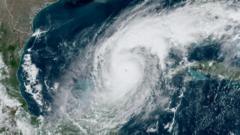The Trump administration's deportation strategies faced serious legal challenges this week, as a federal judge expressed anger over the government's violation of court orders. The controversial practice of deporting individuals to countries they have no connection to, with insufficient notice, is under increased scrutiny.
Controversial Deportation Policies of the Trump Administration Under Legal Scrutiny

Controversial Deportation Policies of the Trump Administration Under Legal Scrutiny
A recent federal court case highlights the Trump administration's contentious tactics on deportation, especially involving sending individuals to unfamiliar third countries.
This week saw a pivotal moment regarding the Trump administration's controversial deportation policies as a federal court confronted the government over its treatment of detainees. The Department of Homeland Security (DHS) has been embroiled in legal battles concerning its decision to send deportees to third countries where they are not citizens, without providing adequate notification or opportunity for appeals.
In April, Judge Brian E. Murphy of the Federal District Court in Boston mandated that deportees must receive at least 15 days of notice before being sent to a third country, along with the chance to contest their transfer if they fear persecution or torture at their destination. However, this week, the DHS disregarded this ruling. They deported eight men—originating from Cuba, Laos, Mexico, Burma, and Vietnam—within just one day. Despite initial notifications indicating their destination as South Sudan, the plane instead landed in Djibouti, leaving their ultimate fate unclear.
Judge Murphy reacted strongly to this breach of protocol, declaring, “The department’s actions in this case are unquestionably violative of this court’s order,” and warned that officials involved could face serious legal consequences. This case raises critical questions about the administration's adherence to humanitarian standards and legal frameworks surrounding deportations, sparking significant debate on the ethical implications of existing immigration policies.





















